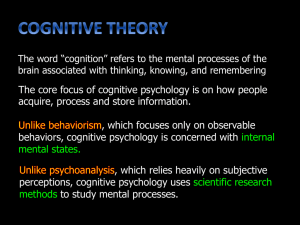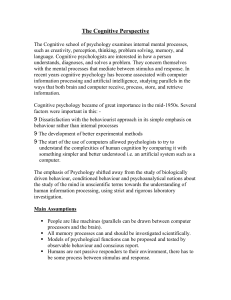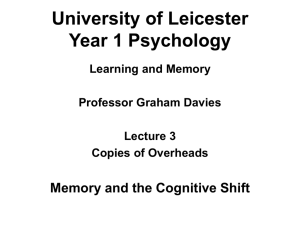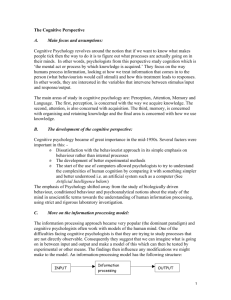Cognitive Psychology
advertisement
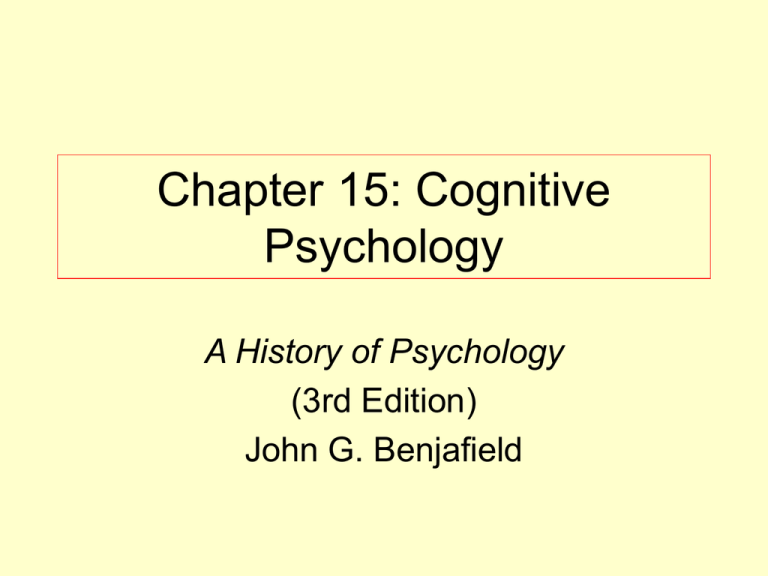
Chapter 15: Cognitive Psychology A History of Psychology (3rd Edition) John G. Benjafield The Concept of ‘Information’ • Computing machine as informationprocessing system • Information is the opposite of uncertainty – Any event that reduces or eliminates uncertainty provides us with information • Information theory supplied the vocabulary for a new model of the process of communication Noam Chomsky (1928–) • Reviewed Skinner’s Verbal Behavior • Argued that behaviourist principles could not explain any significant aspects of language • Any theory of language must explain the fact that natural language is inherently creative Syntactic Structures • Surface structure: the level made up by the particular words that make a sentence – Spoken one word at a time – Each successive word does not act as a stimulus for the next word in the sentence • Deep structure: grammatical transformations from which surface structure is derived Cartesian Linguistics • Chomsky considered his theory to be descended from that of Descartes • Descartes: human behaviour cannot be understood in a completely mechanical manner • Descartes: our most human capacities are innate George A. Miller (1920–) • 1950s: Harvard • 1956: – Symposium on information theory held at MIT • Chomsky, Allen Newell, Herbert Simon – Jerome Bruner: A Study of Thinking The Magical Number Seven • Channel capacity: how much information can be accurately transmitted through the participant • Span of immediate memory: amount of information we can hold in the mind at one time – Seven items, plus or minus two Plans and the Structure of Behavior • One of the first attempts to give cognitive psychology a coherent theoretical framework • Drew on information theory, Chomskyian psycholinguistics, cybernetics • Feedback loop: process in which the output of one part of a system affects another part of the system, which in turn affects the first part • TOTE mechanisms: basic unit of behavioural control (test-operate-test-exit) Subjective Behaviourism • Thinking aloud: technique used by psychologists interested in studying thinking • What people say when asked to think aloud is different from what they say when asked to introspect • Subjective behaviourism Giving Psychology Away • Miller’s APA presidential address – Cautioned psychologists against using their expertise to act as agents of social control – Better goals: understanding and prediction – Suggested psychology be given away in order to accomplish these goals Jerome S. Bruner (1915–) • Conducted seminal research on everything from perception and thinking to child development • Believes there is a consistent functionalist orientation across all his investiagtions The New Look in Perception • 1940s–1950s: ‘New Look’ – Research program in perception – Focused on the effects of need, interest, and past experience on the manner of organization of the perceptual field • Minimax axiom: people organize the perceptual field in such a way as to maximize percepts relevant to current needs and expectations – Central axiom The New Look in Perception • Events that do not fit our expectancies strike us an incongruous • Perceptual readiness: the degree to which one is prepared to perceive what is in the environment • Criticisms: – Inadequate controls – Too much emphasis on internal, personal determinants of perception A Study of Thinking • Concept attainment: the process by which categories develop • Any time we do not regard an event as unique but as belonging to a particular category, we are making use of concepts • Criticism: – Concepts studied somewhat artificial Sir Frederic Bartlett (1886–1969) • Method of serial reproduction: – Giving an experimental participant something to learn and remember – What the first participant remembers is then given to a second participant to learn and remember – What the second participant remembers is given to a third participant to learn and remember, and so on Sir Frederic Bartlett • Ex. ‘The War of the Ghosts’ • Believed that the kinds of transformations observed using the method of serial reproduction were precisely the same transformations that happen to an individual’s memory over time • Schema: an active organization of past reactions that provided a setting within which individual events were understood and remembered Ulric Neisser (1928–) • Undergraduate degree at Harvard – Worked with George Miller • Master’s degree at Swarthmore – Home to Gestalt psychologists • PhD at Harvard • 1957: position at Brandeis University – Influenced by Abraham Maslow Cognitive Psychology • Became the bible of the new psychology • Neisser’s view of the relationship between cognitive processes and computer programs became standard for most cognitive psychologists Cognitive Psychology • Traced flow of information through the organism – Icon → Iconic storage → Pattern recognition → Attention • Reappearance hypothesis: notion that information is retrieved from memory in the form in which it is stored • Utilization hypothesis: we store traces of earlier cognitive acts, not the products of those acts Influence of Cognitive Psychology • Many psychologists treated the experimental study of cognitive processes as if they existed in isolation from other psychological processes • Atkinson and Shiffrin model of memory – Sensory register – Short-term store (Working memory) – Long-term store James J. Gibson (1904–1979) • Distinctive approach to perception – Ecological approach • Two meanings of information: 1. Information about the external world received in the form of signals that we must encode in order to process the information contained in them 2. Information about the world can be picked up directly Cognition and Reality • Ecological validity: something to say about what people do in real, culturally significant situations Herbert A. Simon (1916–2001) • 1978: Nobel prize for economics • PhD in political science • Important contributions to cognitive psychology Spurious Correlation and the Nature of Causality • Spurious correlation: occurs whenever the correlation between two variables is due to a common cause – Concept implies the existence of a true correlation – Problem: how are these distinguished? Computer Simulation • Turing’s Test – Alan Turing – ‘Can computers really think?’ – Concrete situation = imitation game • Artificial intelligence – Series of computer simulations of human thinking written by Allen Newell and Herbert Simon • Ex. program to play chess Criticisms of Computer Simulation • What they appear to leave out – Ex. Emotions • Computer programs do not show the kind of insightful behaviour that Gestalt psychologists believed to be characteristic of problem solving • Computer tells us nothing of how the nervous system works, therefore inadequate explanation of human behaviour Amos Tversky (1937–1996) and Daniel Kahneman (1934–) • Collaborative research program • Focus: judgment and choice – Good judgment is a prerequisite for being able to make good decisions • Kahneman – Won Nobel prize for economics in 2002 – Dual process theory in which judgment is the outcome of two distinct systems • System 1: intuition • System 2: reason Heuristics and Biases • Heuristics: rules of thumb • Biases: ways in which we are predisposed to make judgments • Tversky and Kahneman – Uncovered several biases associated with particular heuristics Intuitive Statistics • Law of large numbers • Law of averages • Gambler’s fallacy Representativeness and the Belief in the Law of Small Numbers • Law of small numbers • Belief in law of small numbers leads to use of the representativeness heuristic Adjustment and Anchoring • When people make judgments of the magnitude of something, the initial value to which they are exposed will bias their judgment Availability • Availability plays a central role in the way we recall previous experiences – There may be experiences we have had that do not come readily to mind Do statistics courses help? • Virtually all psychology majors take courses in research methods and statistics • Undergraduate training in research methods may not automatically lead students to successfully apply what they have been taught
